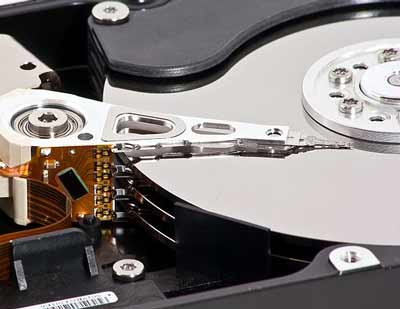Hard Drive in Recovery
You probably wouldn't worry about the hard drive existence at all, if that device was just a vital part of computer and an operating system carrier, but as soon as it gets broken, you realize that little box called the hard drive is a container of all your every day digital work and it’s out of your reach now. And all what you need to get it back is a professional help. And that’s where we come in as a professional data recovery specialist.
There have been produced thousands of new and old models of hard drives and each and every model requires a certain set of parts, tools along with data recovery techniques, making the data recovery industry one of the most sophisticated business, which demands a very serious contribution in the research and lab equipment as well as recruiting professional engineers with hard-to-find skills for such work.
The main concept of any hard drive is to store the digital information on a spinning disk covered with thin layer of special magnetic material, similar to one that was used on the old-fashioned audio/video tapes. However, the reading/writing head flies over the disk surface without touching it, in contrast with the older recording devices with inherent friction between the head and the tape. There is no physical contact with the data layer and there is no more similarity with your old VCR. That no-contact reading/writing head feature is a major advantage for the data protection from physical tear and wear damage, making HDD the most reliable and safe among other digital storages such as CD, flash, or SSD.
Enemy to the drive
The data layer may start deteriorating when spinning at high speed disk makes physical contact with the flying head. Sometimes it happens without obvious reasons, but events like a computer dropping can contribute a big deal to the disaster.
Repetitive loud clicking or quiet ticking sounds must be considered as red alert and terrifying sign of permanent process of loosing data. Some modern models of hard drives can intercept with such drive failure and seize the motor. That helps very much to avoid any further damages to disk surface, especially in the situation when the computer or the external data storage is left unattended. That is the best way to conserve the data disks from the inevitable consequences following by overusing after the drive’s crash. Ironically, from this point of view any dead hard drive is a perfect candidate for successful recovery.
In reality there is only one and last ditch that stands against the disk (data) scratching - it is the user that has decided to pull the plug, when it is not too late for salvaging the data.
HDD Review and Opinion from LaptopData Lab
The resistance to scuffing (scratching) must be the main criteria when choosing the drive as data storage. When you keep data on scratch-resistant HDD, it gives us a better chance to salvage every byte of information from every sector on disk. Seagate Barracuda 7200.11, and practically all WD, Toshiba and Fujitsu drives are most scratch-resistant hard drives.
Hard drives with a high risk of loosing data due to fast scratch development to the internal disk platters after its failure are Seagate for laptops, and all old Hitachi and Maxtor.
There is a known fact that most failed hard drives change many hands before landing into the clean room data recovery lab. It is understandable decision to try to repair hard drives at local computer repair shop. The thing is any extra middle man between you and our lab can contribute an extra dust and scratches to the drive, lowing chances of recovery. Make this path shorter is up to you.
Ripped off Head
The modern metal-based spintronic heads are used to record data by magnetizing ferromagnetic material coating the surface of rotating disks. The thin layer of air is keeping the heads from contacting with disk surface. The little square head is attached to the supporting arm. A slightly bended arm creates a little pressing force to keep head close to disk. If the head are separated from the supported arm, the bare metal arm starts scratching the disk. This is major a disaster for data, if someone try to turn on the drive, let say for testing purposes in the computer shop. This is just an example how important apply to professional help in timely manner.



